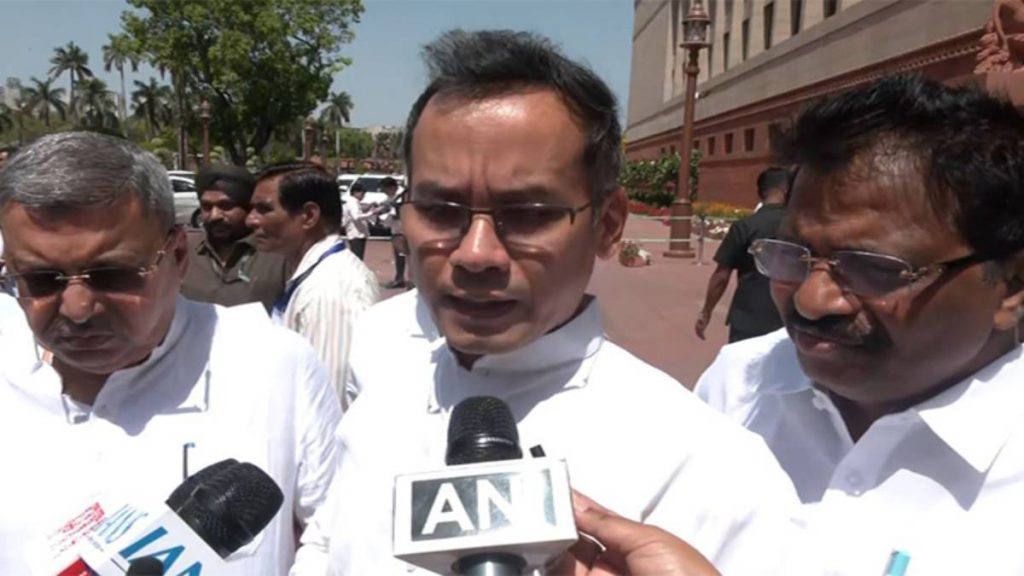Congress MP and Deputy Leader of Opposition in Lok Sabha, Gaurav Gogoi, on Tuesday strongly opposed the Waqf Amendment Bill, asserting that the entire nation is witnessing how democracy is being suppressed in the Lok Sabha.
“We walked out of the House. I don’t know what is in their (government’s) mind. I hope that the Speaker will take note of all of this. The entire country is seeing how the voice of democracy is being crushed slowly in the Lok Sabha,” Gogoi told ANI.
Meanwhile, opposition MPs staged a walkout from the Business Advisory Committee (BAC) meeting, accusing the government of bulldozing its agenda without listening to the opposition’s concerns.
Gogoi emphasized that all opposition parties had demanded discussions on various pressing issues, including the EPIC cards issue, Manipur’s Presidential Rule resolution, and the Waqf Amendment Bill, under Rule 193.
“The opposition parties have walked out in protest because the government is simply bulldozing its agenda and not considering the opposition’s views. We requested a comprehensive discussion on the Waqf Amendment Act, but our concerns are being ignored. We also sought proper time allocation for discussing the President’s Rule in Manipur, but our request was dismissed. We called for discussions on voter EPIC cards and their linkage with Aadhaar. However, none of our demands were considered. The BAC meeting has become subservient to the whims of the ruling party. There is no space left for opposition leaders. We had no choice but to walk out as a mark of protest,” Gogoi told reporters.
Expressing dissatisfaction, TMC MP Kalyan Banerjee also criticized the government’s approach, stating that the opposition had been forced to walk out due to the lack of meaningful discussions.
“This is a very sorry state of affairs. From the first part of the Budget session, we have been requesting discussions under Rule 193, especially on EPIC and other pressing issues. If the BAC meeting only serves the ruling party’s agenda, then what is the point of holding these meetings? Parliament is equally important for the opposition,” Banerjee said.
AIMIM chief Asaduddin Owaisi also strongly opposed the Waqf Amendment Bill, calling it unconstitutional and a “grave violation” of Articles 14, 25, 26, and 29 of the Indian Constitution.
“This is not a Waqf Bill, but a ‘Waqf Barbaad Bill.’ If NDA allies like Nitish Kumar, Chandrababu Naidu, Chirag Paswan, and Jayant Chaudhary are supporting it, they must answer to the people. If non-Hindus cannot be members of the Hindu Endowment Board, then why allow non-Muslims in Waqf Boards?” Owaisi questioned.
Union Minister of Minority Affairs Kiren Rijiju countered opposition criticism, stating that the Waqf law has existed for decades and that opposition leaders are misleading people.
“Some people claim the Waqf Amendment Bill is unconstitutional. Waqf rules have been in place since before independence. How can a law that has existed for so long suddenly be illegal? Misinformation is being spread to create fear among Muslims, which is harmful to society and the nation,” Rijiju said.
Several opposition parties continue to oppose the proposed amendments to the Waqf Act. The Waqf (Amendment) Bill, also known as the ‘Unified Waqf Management, Empowerment, Efficiency, and Development (UMEED) Bill,’ aims to address key challenges through digitization, enhanced audits, improved transparency, and legal mechanisms to reclaim illegally occupied properties.
The Waqf Act of 1995 was enacted to regulate Waqf properties, but it has faced criticism due to issues such as mismanagement, corruption, and encroachments.
